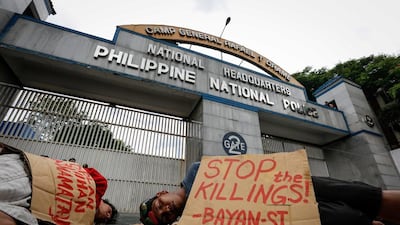MANILA // Pedicab driver Reyjin dives into a neighbour’s house for a quick meth fix, fearful of taking a bullet to the head in Philippine president Rodrigo Duterte’s brutal war on drugs yet unable to quit.
More than 2,000 people have died violent deaths since Mr Duterte took office two months ago and immediately implemented his scorched-earth plans to eradicate drugs in society, ordering police to shoot dead traffickers and urging ordinary citizens to kill addicts.
The bloodbath has seen unknown assailants kill more than half the victims, according to police, raising fears that security forces and hired assassins are shooting dead anyone suspected of being involved in drugs.
Armed police constantly circle in Reyjin’s Manila slum community, but he continues to snort the fumes of the highly addictive methamphetamine known as “shabu” that Mr Duterte has warned is destroying the lives of millions of poor Filipinos.
“It’s scary because I could be next,” said the gaunt, gap-toothed 28-year-old, speaking on the condition his identity not be revealed.
The father-of-three said two masked motorcycle gunmen riding in tandem on a motorcycle had shot dead a woman who sold small amounts of drugs to him.
“She was sitting in the alley when she took two bullets to the head,” he said.
Such murders are one of the most common forms of killings by the shadowy assassins.
Often, a piece of cardboard – with “drug peddler” or “drug addict” written on it – is placed on the corpse. This has led to the war on crime becoming known as “cardboard justice”.
Meanwhile, police have reported killing 756 people they have branded drug suspects.
National police chief Ronald dela Rosa has repeatedly defended his officers, insisting they only kill when their own lives are in danger.
However, two policemen have been charged with murder over the jailhouse deaths of a father and son, who autopsies showed to have been beaten so badly before being shot that their limbs were broken.
The United Nations, the US government and human rights groups have expressed alarm at the bloodshed.
Mr Duterte and Mr Dela Rosa have repeatedly insisted they are acting within the boundaries of the law, while accusing their critics of siding with the drug traffickers and ignoring the devastating consequences of what they describe as a national shabu crisis.
They say most of the unexplained deaths are being carried out by drug syndicates waging war on each other.
In Reyjin’s Manila slum, the violence and security presence has slowed the drug trade and made shabu more expensive.
But the drugs are still available, in what could be a worrying sign for Mr Duterte who vowed during the election campaign that he could completely wipe out the trade within six months.
“If you want to buy, you just go stand there on the street and somebody will approach you,” said Reyjin, who took his first hit of shabu when he was 13.
“You hand over the money and he will tell you to wait and have somebody else deliver the drugs to you.”
Neighbours said the eldest of Reyjin’s three children, a grade-schooler, looked malnourished and often went to school hungry.
The two other siblings looked dirty and were forced to wear hand-me-down clothes in their one-room house, they added.
Neighbours also suspected Reyjin of stealing small items from their homes to fund his habit.
Reyjin was aware of the toll his habit took on his family. But, even compounded by the threat of his children being orphaned in the drug war, he said he could not stop taking shabu.
“Sometime I tell myself I have to stop,” he said. “But my body craves it.”
* Agence France-Presse

